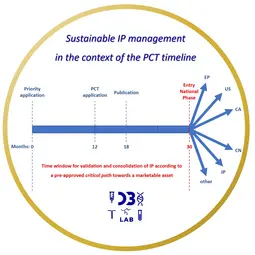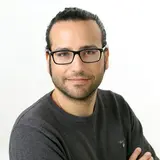DKFZ Drug Discovery Lab (D3Lab)
- Immunology, Infection and Cancer

Prof. Dr. Rienk Offringa
Group Leader
The mission of the DKFZ Drug Discovery Laboratory (D3Lab) is the valorization of academic research findings that may form the basis for the development of new treatment modalities for cancer patients. Our expertise lies in the area of critical path research aimed at the systematic validation of scientific concepts, hit-to-lead drug discovery, in vitro/in vivo pharmacology, and the definition of a rational path towards first-in-human clinical trials.

Our Research
The D3lab emerged from the DKFZ-Bayer Immunotherapeutics laboratory that over the past 10 years served as the hub for immuno-oncology (I.O.) drug development in the context of the DKFZ-Bayer Strategic Alliance. During this period, our lab functioned as the interface between our academic colleagues at DKFZ and the various functions at Bayer Pharma, thereby bridging the cultural differences between academia and pharmaceutical industry, often referred to as the valley of death. This resulted in a vibrant pipeline of >30 diverse drug discovery projects aimed at the development of I.O. biologicals and small molecule drugs. For 4 of these projects, our lab was involved in the complete trajectory from target validation, through early and late stage drug development, towards the achievement of INDs (investigational new drug applications).
Since the conclusion of the DKFZ-Bayer Strategic Alliance per mid-2024, our team continues this mission as D3Lab, with the goal of valorizing in-house research findings to a level that supports effective clinical translation. Notably, the latter usually requires funding and infrastructure that is not available in academia, and therefore partnering with pharma or founding of a spin-off biotech venture. A typical problem in academia is that scientists file a patent priority application with the intent to enable clinical translation, but subsequently focus on concluding the publication of their finding, after which they move on to creating their next publishable story. Given the ‘publish or perish’ culture, this is fully understandable. The logical, but unfortunate consequence is that the creation of further value with respect to the IP intellectual property (IP) filing is put on the backburner. Notably, the period of two and a half years following the priority filing offer a critically important time window for validation and consolidation of the invention(s) concerned. Subsequently, the IP filing enters the national phase, in the context of which separate filings in different regions/countries of the world have to be arranged and managed. This is when management and maintenance of patents becomes very expensive.
Bottom line: in an academic environment such as the DKFZ, patenting of research findings is only sustainable when limited to well-consolidated IP filings with a clearly defined market potential. The pursuit of IP noncompliant with these standards is a notoriously lossy practice. To avoid an expanding patent portfolio lacking payoff potential, the Go/No-Go requirement for each priority application must therefore involve a well-defined plan towards validation and consolidation of the IP concerned. A main hurdle in implementing this, is the fact that academic scientists are not familiar with critical path research, the rules of which are very different from regular preclinical experimentation. This is where our D3Lab-team, based on hands-on experience, can advise and make concrete experimental contributions. Notably, the scope of the lab has been extended to oncology drug discovery, the rationale being that the honeymoon years of I.O. are over. Consequently, the focus of drug discovery has shifted back to mechanisms directly affecting tumor malignancy. Given the experimental and conceptual complexity of I.O. research, especially with respect to in vivo pharmacology, this is not an obstacle for our team.
Nevertheless, the second main hurdle with respect to the implementation of critical path research is more difficult to overcome. Fact is that true incentives for allocating efforts and resources towards this goal are currently lacking, both for individual scientist and for academic institutes. In spite of all good intentions to improve patient care, the primary criterion for valuing research output is still the number and impact of academic, peer-reviewed publications.
The decision by the DKFZ Management, after conclusion of the DKFZ-Bayer Alliance, to support continuation of our lab indicates that these matters are currently on the DKFZ agenda. In the context of our new mission, the D3Lab team is currently focusing on three efforts:
Management of the former DKFZ-Bayer portfolio, currently including 8 projects, in particular by addressing critical issues concerning experimental validation and market value. Go/No-Go decisions will be made by the end of 2025, based on the aforementioned criteria, with respect to continuation of these projects and maintenance of the corresponding IP.
Engagement with selected DKFZ colleagues on novel drug discovery projects, with a focus on validation of the underlying concepts (thus far, 2 projects were initiated)
Orchestration of a systematic exchange with the DKFZ Innovation Management Department involving critical evaluation of the existing IP portfolio, as well as establishment of a new workflow to provide guidance to DKFZ scientists with respect to the filing and consolidation of new IP.
Team
-

Dr. Rafael Carretero
Postdoc and Team Leader
-
Dr. Alejandro Hernandez Sanchez
PostDoc
-
Kai Kipfstuhl
Technical Assistant
-

Anette Merling
Technical Assistant
-
Sabine Schmitt
Technical Assistant
-

Tihomira Shatova
Technical Assistant
Patent Filings
IP filings DKFZ-Bayer Alliance with involvement DKFZ-Bayer Immunotherapeutics Lab (2016 – 2024; n = 25)
Carcinoembryonic antigen-related cell adhesion molecule 6 (CEACAM6) blocking antibodies:
Anti-CEACAM6 antibodies and uses thereof
DKFZ-Bayer Lab members listed as inventors: Jessica PINKERT, Philip BECKHOVE, Yingzi GE
WO2016150899A2
2016-03-21 Application filed by Bayer Pharma AG
Pharmaceutical combination of anti-CEACAM6 and either anti-PD-1 or anti-PD-L1 antibodies for the treatment of cancer
DKFZ-Bayer Lab members listed as inventors: Rienk OFFRINGA, Hans-Henning BÖHM, Philip BECKHOVE
WO2020099230A1
2019-11-07 Application filed by Bayer Aktiengesellschaft, Deutsches Krebsforschungszentrum
Pharmaceutical combination of anti CEACAM6 and tim3 antibodies
DKFZ-Bayer Lab members listed as inventors: Rienk OFFRINGA, Hans-Henning BÖHM, Philip BECKHOVE
WO2020126808A1
2019-12-12 Application filed by Bayer Aktiengesellschaft, Deutsches Krebsforschungszentrum
Anti-CEACAM6 antibodies with reduced side effects
DKFZ-Bayer Lab members listed as inventors: Rafael CARRETERO, Rienk OFFRINGA
WO2023031366A1
2022-09-01 Application filed by Deutsches Krebsforschungszentrum Stiftung des öffentlichen Rechts
Aryl hydrocarbon receptor (AHR) small molecule inhibitors:
2-heteroaryl-3-oxo-2,3-dihydropyridazine-4-carboxamides for the treatment of cancer
DKFZ-Bayer Lab members listed as inventors: Christina KOBER, Rafael CARRETERO
WO2018146010A1
2018-02-02 Application filed by Bayer Aktiengesellschaft, Bayer PharmaAktiengesellschaft, Deutsches Krebsforschungszentrum
Sulphur substituted 3-oxo-2,3-dihydropyridazine-4-carboxamides
DKFZ-Bayer Lab members listed as inventors Christina KOBER, Rafael CARRETERO
WO2019101642A1
2018-11-16 Application filed by Bayer Aktiengesellschaft, Bayer PharmaAktiengesellschaft, Deutsches Krebsforschungszentrum
[1,2,4]triazolo[1,5-c]quinazolin-5-amines
DKFZ-Bayer Lab members listed as inventors: Christina KOBER, Daniel BAUMANN
WO2021028382A1
2020-08-10 Application filed by Bayer Aktiengesellschaft, Bayer PharmaAktiengesellschaft, Deutsches Krebsforschungszentrum
Pyrido[1,2,4]triazolo[1,5-c]pyrimidin-5-amines
Julien Christina KOBER, Daniel BAUMANN
WO2022029063A1
2021-08-02 Application filed by Bayer Aktiengesellschaft, Bayer PharmaAktiengesellschaft, Deutsches Krebsforschungszentrum
Pyrido[1,2,4]triazolo[1,5-c]pyrimidin-5-amines
DKFZ-Bayer Lab members listed as inventors: Christina KOBER, Daniel BAUMANN
WO2022029063A1
2021-08-02 Application filed by Bayer Aktiengesellschaft, Bayer PharmaAktiengesellschaft, Deutsches Krebsforschungszentrum
Mitogen-activated protein kinase kinase kinase kinase 1 (MAP4K1/HPK1) small molecule inhibitors:
Substituted pyrrolopyridine-derivatives as MAP4K1 modulators for the treatment of cancer diseases
DKFZ-Bayer Lab members listed as inventors: Rafael CARRETERO, Rienk OFFRINGA
WO2018228923A1
2018-06-07 Application filed by Bayer Pharma Aktiengesellschaft, Bayer Aktiengesellschaft, Deutsches Krebsforschungszentrum Heidelberg
Substituted pyrrolopyridine-derivatives
DKFZ-Bayer Lab members listed as inventors: Rafael CARRETERO, Rienk OFFRINGA
WO2018228925A1
2018-06-07 Application filed by Bayer Pharma Aktiengesellschaft, Deutsches Krebsforschungszentrum Heidelberg
Substituted pyrrolopyridine-derivatives
DKFZ-Bayer Lab members listed as inventors: Rafael CARRETERO, Rienk OFFRINGA
WO2018228920A1
2018-06-07 Application filed by Bayer Pharma Aktiengesellschaft, Deutsches Krebsforschungszentrum Heidelberg, Bayer Aktiengesellschaft
Substituted pyrrolopyridine-derivatives
DKFZ-Bayer Lab members listed as inventors: Rafael CARRETERO, Rienk OFFRINGA
WO2019016071A1
2018-07-12 Application filed by Bayer Pharma Aktiengesellschaft, Bayer Aktiengesellschaft, Deutsches Krebsforschungszentrum
Substituted pyrrolopyridine-derivatives
DKFZ-Bayer Lab members listed as inventors: Rafael CARRETERO, Rienk OFFRINGA
WO 2020120257A1
2019-12-04 Application filed by Bayer Aktiengesellschaft, Deutsches Krebsforschungszentrum
Spiro-fused tricyclic MAP4K1 inhibitors
DKFZ-Bayer Lab members listed as inventors: Rafael CARRETERO, Rienk OFFRINGA
WO2021074279A1
2020-10-15 Application filed by Bayer Aktiengesellschaft, Deutsches Krebsforschungszentrum
2'-(quinolin-3-yl)-5',6'-dihydrospiro[azetidine-3,4'-pyrrolo[1,2-b]pyrazole]-1-carboxylate derivatives and related compounds as MAP4K1 (HPK1) inhibitors for the treatment of cancer
DKFZ-Bayer Lab members listed as inventors: Rafael CARRETERO, Rienk OFFRINGA
WO2021249913A1
2021-06-07 Application filed by Bayer Aktiengesellschaft, Deutsches Krebsforschungszentrum
MAP4K1 inhibitors
DKFZ-Bayer Lab members listed as inventors: Rafael CARRETERO, Rienk OFFRINGA
WO2022167627A1
2022-02-04 Application filed by Bayer Aktiengesellschaft, Deutsches Krebsforschungszentrum
New MAP4K1 Inhibitors
DKFZ-Bayer Lab members listed as inventors: Rafael CARRETERO, Rienk OFFRINGA
WO2025021997A1
2024-07-26 Application filed by Deutsches Krebsforschungszentrum Stiftung des öffentlichen Rechts
Diacyglycerol Kinase (DGK) alpha and zeta-selective small moleculeinhibitors:
Substituted aminoquinolones as DGKalpha inhibitors for immune activation
DKFZ-Bayer Lab members listed as inventors: Christina KOBER, Rienk OFFRINGA
WO2021105115A1
2020-11-24 Application filed by Bayer Aktiengesellschaft, Bayer PharmaAktiengesellschaft, Deutsches Krebsforschungszentrum
Substituted aminoquinolones as DGKalpha inhibitors for immune activation
DKFZ-Bayer Lab members listed as inventors: Christina KOBER, Rienk OFFRINGA
WO2021105116A1
2020-11-24 Application filed by Bayer Aktiengesellschaft, Bayer PharmaAktiengesellschaft, Deutsches Krebsforschungszentrum
Substituted aminoquinolones as DGKalpha inhibitors for immune activation
DKFZ-Bayer Lab members listed as inventors: Christina KOBER, Mareike GREES, Rienk OFFRINGA
WO2021105117A1
2020-11-24 Application filed by Bayer Aktiengesellschaft, Bayer PharmaAktiengesellschaft, Deutsches Krebsforschungszentrum2020-06-19 Priority toEP20181065.2
Substituted aminothiazoles as DGKzeta inhibitors for immune activation
DKFZ-Bayer Lab members listed as inventors: Mareike GREES, Corinna LINK, Rienk OFFRINGA
WO2021214019A1
2021-04-20 Application filed by Bayer Aktiengesellschaft, Deutsches Krebsforschungszentrum
Substituted aminothiazoles as DGKzeta inhibitors for immune activation
DKFZ-Bayer Lab members listed as inventors: Corinna LINK, Rienk OFFRINGA
WO2021214020A1
2021-04-20 Application filed by Bayer Aktiengesellschaft, Deutsches Krebsforschungszentrum
Combinations of DGK (diacylglycerol kinase) inhibitors
DKFZ-Bayer Lab members listed as inventors: Catherine OLESCH, Frederik CICHON, Rienk OFFRINGA
WO2024165470A1
2024-02-05 Application filed by Bayer Aktiengesellschaft, Deutsches Krebsforschungszentrum
Combination of CCR8 antibodies with DGK inhibitors in the treatment of cancer
DKFZ-Bayer Lab members listed as inventors: Rienk OFFRINGA
WO2024165468A1
2024-02-05 Application filed by Bayer Aktiengesellschaft, Deutsches Krebsforschungszentrum
Selected Publications
Mowat J, Carretero R, Leder G, Aiguabella Font N, Neuhaus R, Berndt S, Günther J, Friberg A, Schäfer M, Briem H, Raschke M, Miyatake Ondozabal H, Buchmann B, Boemer U, Kreft B, Hartung IV, Offringa R.
Kober C, Roewe J, Schmees N, Roese L, Roehn U, Bader B, Stoeckigt D, Prinz F, Gorjánácz M, Roider HG, Olesch C, Leder G, Irlbacher H, Lesche R, Lefranc J, Oezcan-Wahlbrink M, Batra AS, Elmadany N, Carretero R, Sahm K, Oezen I, Cichon F, Baumann D, Sadik A, Opitz CA, Weinmann H, Hartung IV, Kreft B, Offringa R, Platten M,
Offringa R, Kötzner L, Huck B, Urbahns K.
Pinkert J, Boehm HH, Trautwein M, Doecke WD, Wessel F, Ge Y, Gutierrez EM, Carretero R, Freiberg C, Gritzan U, Luetke-Eversloh M, Golfier S, Von Ahsen O, Volpin V, Sorrentino A, Rathinasamy A, Xydia M, Lohmayer R, Sax J, Nur-Menevse A, Hussein A, Stamova S, Beckmann G, Glueck JM, Schoenfeld D, Weiske J, Zopf D, Offringa R, Kreft B, Beckhove P, Willuda J.
Offringa R, Glennie MJ.
Get in touch with us



